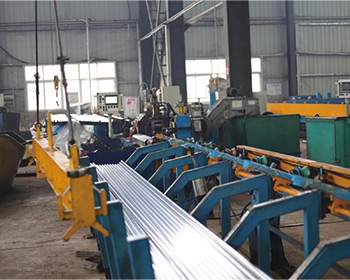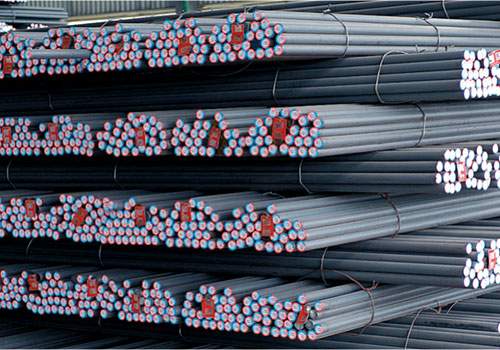
Steel Round Bar: 8 Essential Facts
Table of Contents
Introduction

Steel round bars are solid cylindrical bars of steel that come in various diameters and lengths. They are primarily used in structural applications, machinery components, and a wide range of other uses. Steel round bars are essential materials for fabricators, manufacturers, and construction workers. Understanding their composition, grades, and manufacturing processes is critical for selecting the right steel round bar for your needs.
Steel round bars are commonly made from carbon steel, alloy steel, stainless steel, and other specialized types of steel. The selection of a particular steel round bar depends on the intended application and the performance requirements, such as strength, corrosion resistance, and heat resistance.
Henan Jiyuan Iron and Steel (Group) Co., Ltd. was founded in 1958. It has rich experience in production and research and development. It provides you with one-stop steel services and welcomes consultations from customers around the world.
What Are the Different Types of Steel Round Bars?

There are several types of round steel rods available, each suited for different applications based on the required properties. Here’s a breakdown of the most common types:
Carbon Round Steel Rod
Carbon round steel rods are the most commonly used type of steel round bar. These bars are known for their strength and affordability. They come in various grades, with the most common being 1018 and 1045. These bars are often used in construction, automotive parts, and general manufacturing.
Alloy Round Steel Rod
Alloy round steel rods contain alloying elements like chromium, nickel, and molybdenum to enhance their mechanical properties. These bars are ideal for applications where strength, toughness, and wear resistance are critical. Alloy steel round bars are often used in aerospace, heavy machinery, and automotive industries.
Stainless Round Steel Rod
Stainless round steel rods are corrosion-resistant and offer high strength, making them ideal for applications in harsh environments. These bars are widely used in the food, pharmaceutical, and chemical industries, as well as in marine and coastal environments. The most commonly used grades of stainless round steel rods are 304 and 316.
Tool Steel Round Steel Rod
Tool round steel rods are known for their hardness and resistance to wear and deformation. These bars are often used in the manufacturing of cutting tools, dies, and other high-stress components. They are commonly found in industries such as tooling, aerospace, and automotive.
Key Properties

When selecting round steel rods, understanding the key properties is essential to ensure the material will perform well in your specific application. Here are some of the key properties to consider:
Strength
Strength is one of the most important properties of round steel rods. The strength depends on the alloy composition and the manufacturing process. Generally, carbon steel has a good balance of strength and ductility, while alloy and tool steels offer higher tensile strength.
Durability
Round steel rods are known for their durability, with the ability to withstand mechanical stress, wear, and fatigue over extended periods. The durability is often determined by the material grade and treatment processes.
Corrosion Resistance
While carbon steel is prone to corrosion, stainless steel and alloy steel rods offer excellent corrosion resistance. Stainless steel, in particular, is highly resistant to rust and other forms of corrosion, making it ideal for use in corrosive environments.
Machinability
The machinability is essential when the material needs to be cut, drilled, or otherwise shaped into specific components. Carbon steel is generally easy to machine, while alloy and tool steels may require specialized tools due to their higher hardness.
How to Choose this Your Project
Selecting the right steel round bar involves understanding your project’s specific requirements. Consider the following factors when making your choice:
Application
Consider the application of the steel round bar. For general construction and automotive parts, carbon steel is often sufficient. However, for parts that will be exposed to high stress or corrosive environments, alloy steel or stainless steel might be more appropriate.
Strength Requirements
If your project requires high-strength materials, such as in aerospace or heavy machinery, alloy or tool steel round bars may be the best option due to their superior strength and resistance to wear.
Corrosion Resistance
In applications where the steel round bar will be exposed to moisture, chemicals, or extreme temperatures, stainless steel or alloy steel round bars offer superior resistance to corrosion, making them ideal for harsh environments.
Cost Considerations
Cost is always a factor in selecting the right material for your project. Carbon steel round bars are generally more affordable than alloy or stainless steel round bars. However, if corrosion resistance or high strength is crucial for the project, the added cost of alloy or stainless steel may be justified.
Grades and Standards
Steel round bars come in various grades, each offering different characteristics and performance benefits. Some of the most common standards for steel round bars include ASTM (American Society for Testing and Materials), AISI (American Iron and Steel Institute), and SAE (Society of Automotive Engineers). Each of these standards defines the chemical composition, mechanical properties, and performance requirements for different types of steel round bars.
Here’s a table outlining some common steel round bar grades and their key characteristics:
| Grade | Composition | Strength (MPa) | Common Uses |
|---|---|---|---|
| 1018 | Carbon steel | 370 | General manufacturing, shafts, axles |
| 1045 | Carbon steel | 570 | Heavy machinery, structural components |
| 304 Stainless | Stainless steel (Cr: 18%) | 515 | Food, pharmaceutical, chemical processing |
| 4140 | Alloy steel (Cr: 1%, Mo: 0.2%) | 655 | Aerospace, automotive, heavy-duty machinery |
| 316 Stainless | Stainless steel (Cr: 16%) | 520 | Marine, chemical, high-corrosion environments |
Conclusion

Steel round bars are essential materials in countless industries, offering a wide range of benefits depending on their composition and application. Whether you need strength, durability, corrosion resistance, or machinability, there’s a steel round bar suited to your needs. By understanding the various types, properties, and grades of steel round bars, you can ensure that you choose the right material for your specific project requirements.
FAQ
What is the difference between carbon steel and stainless round steel rod?
The primary difference between carbon steel and stainless steel round bars lies in their composition. Carbon steel round bars are made primarily of iron and carbon, while stainless steel contains at least 10.5% chromium, which gives it its corrosion-resistant properties. Stainless steel round bars are ideal for applications in harsh, corrosive environments, while carbon steel is better for general-purpose uses.
Can steel round bars be welded?
Yes, steel round bars can be welded. However, the weldability depends on the material grade. Carbon steel round bars are generally easier to weld than stainless steel or alloy steel round bars. For welding stainless steel round bars, special considerations such as pre-heating and post-weld heat treatment may be necessary to avoid cracking or distortion.
How do I measure the size of a steel round bar?
The size of a steel round bar is typically measured by its diameter and length. Diameters can range from a few millimeters to several inches, and lengths can vary widely, depending on the application. Most suppliers provide standard lengths, but custom lengths can also be ordered.
Are steel round bars available in different finishes?
Yes, steel round bars are available in various finishes, including cold drawn, hot rolled, and polished finishes. Cold-drawn bars have a smoother surface and are often used for precision applications, while hot-rolled bars are typically used for structural applications. Polished steel round bars are used in applications where appearance and corrosion resistance are important.
How do I maintain steel round bars?
To maintain steel round bars, it is important to keep them clean and dry to prevent rust and corrosion. For carbon steel, regular maintenance might include applying oil or a protective coating. For stainless steel, periodic cleaning with a non-abrasive cleaner can help maintain its shine and prevent staining.






